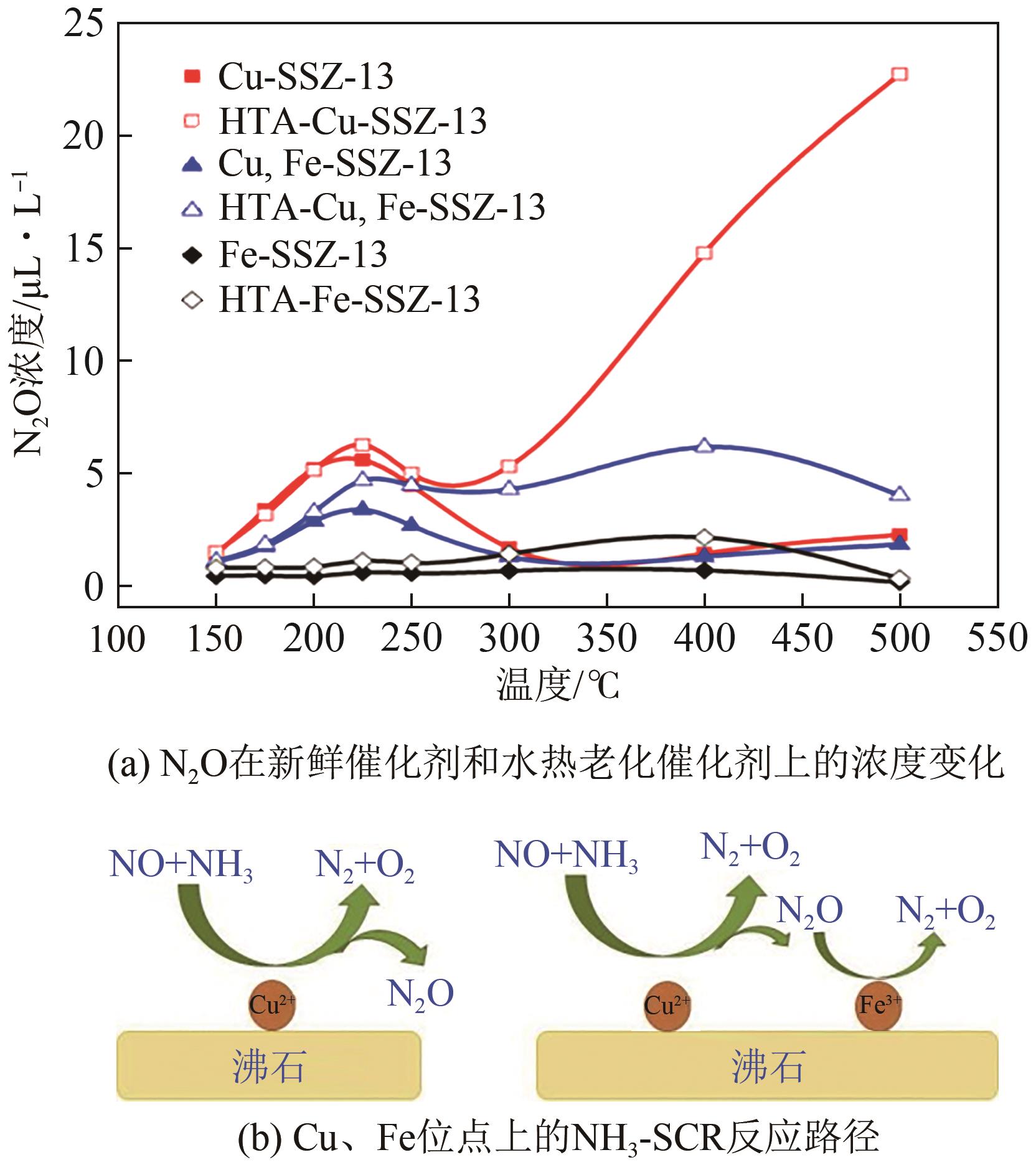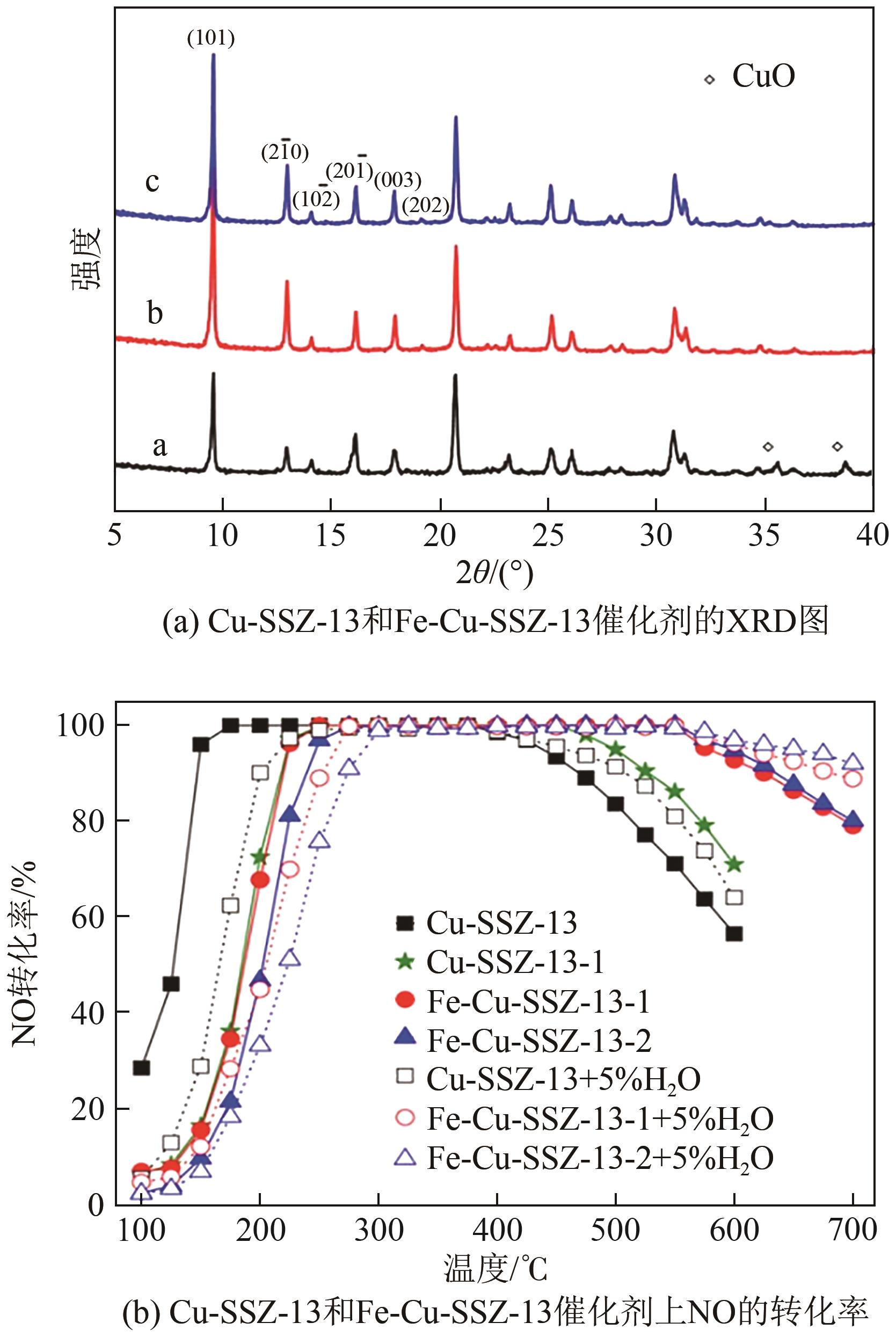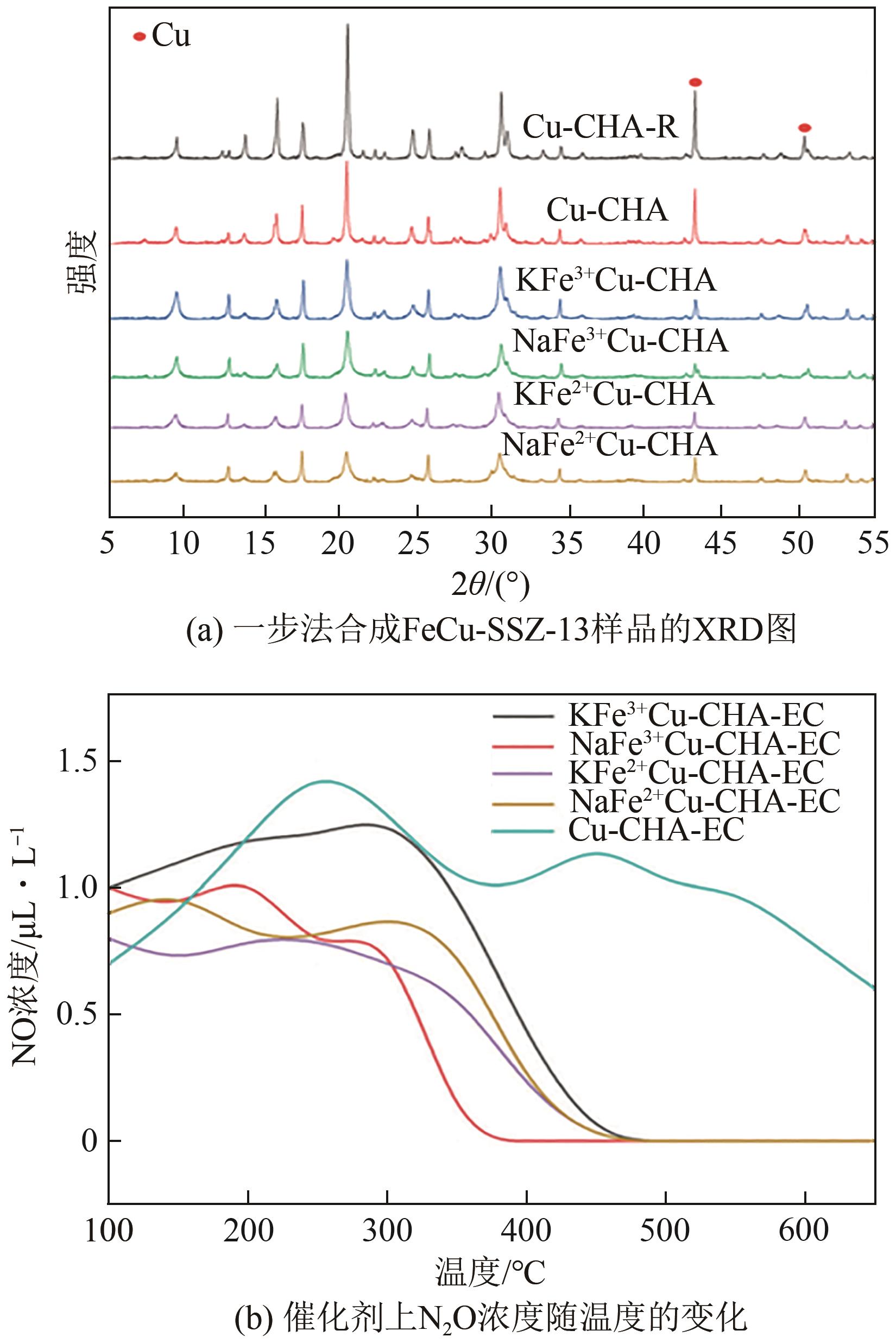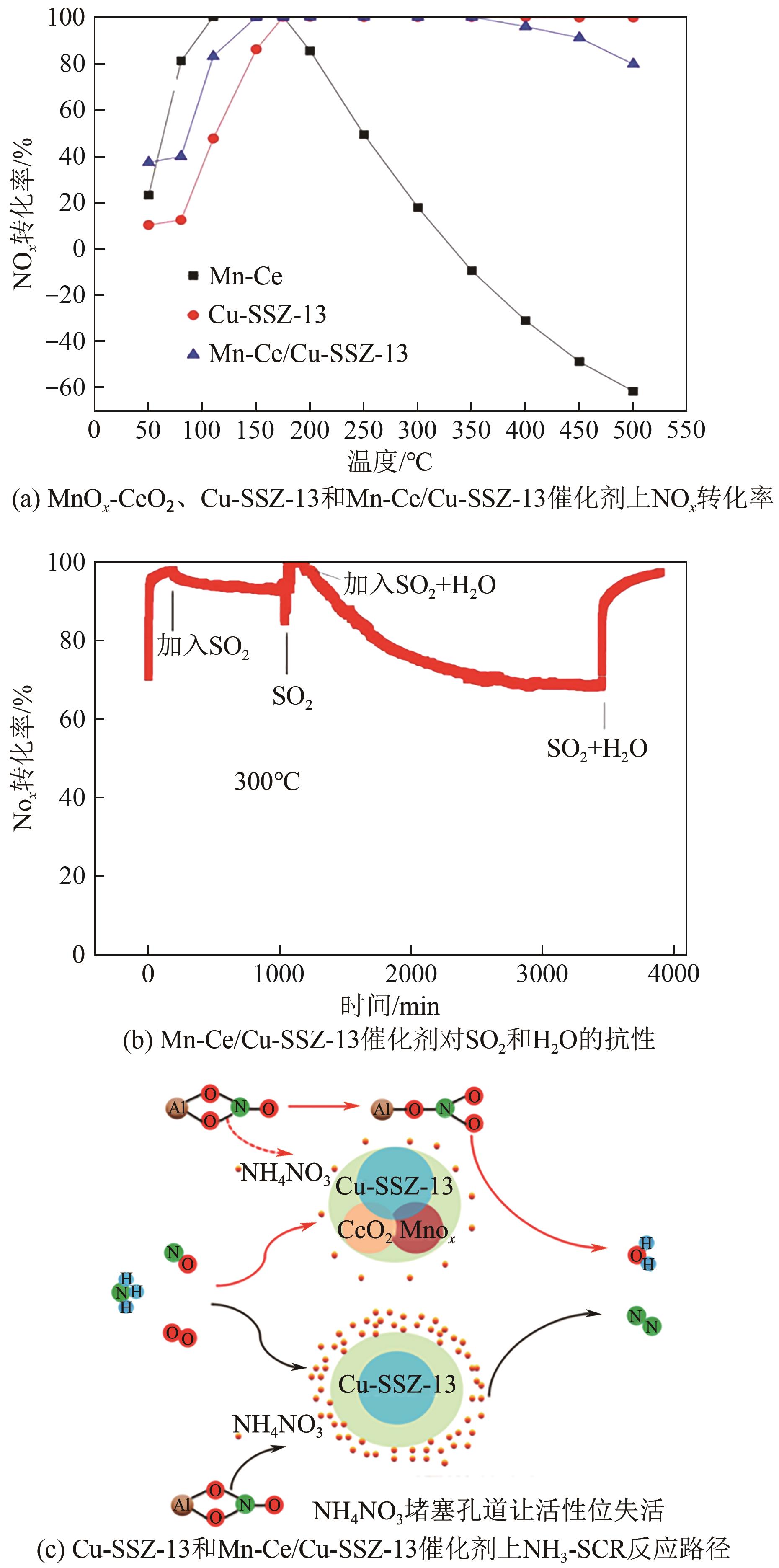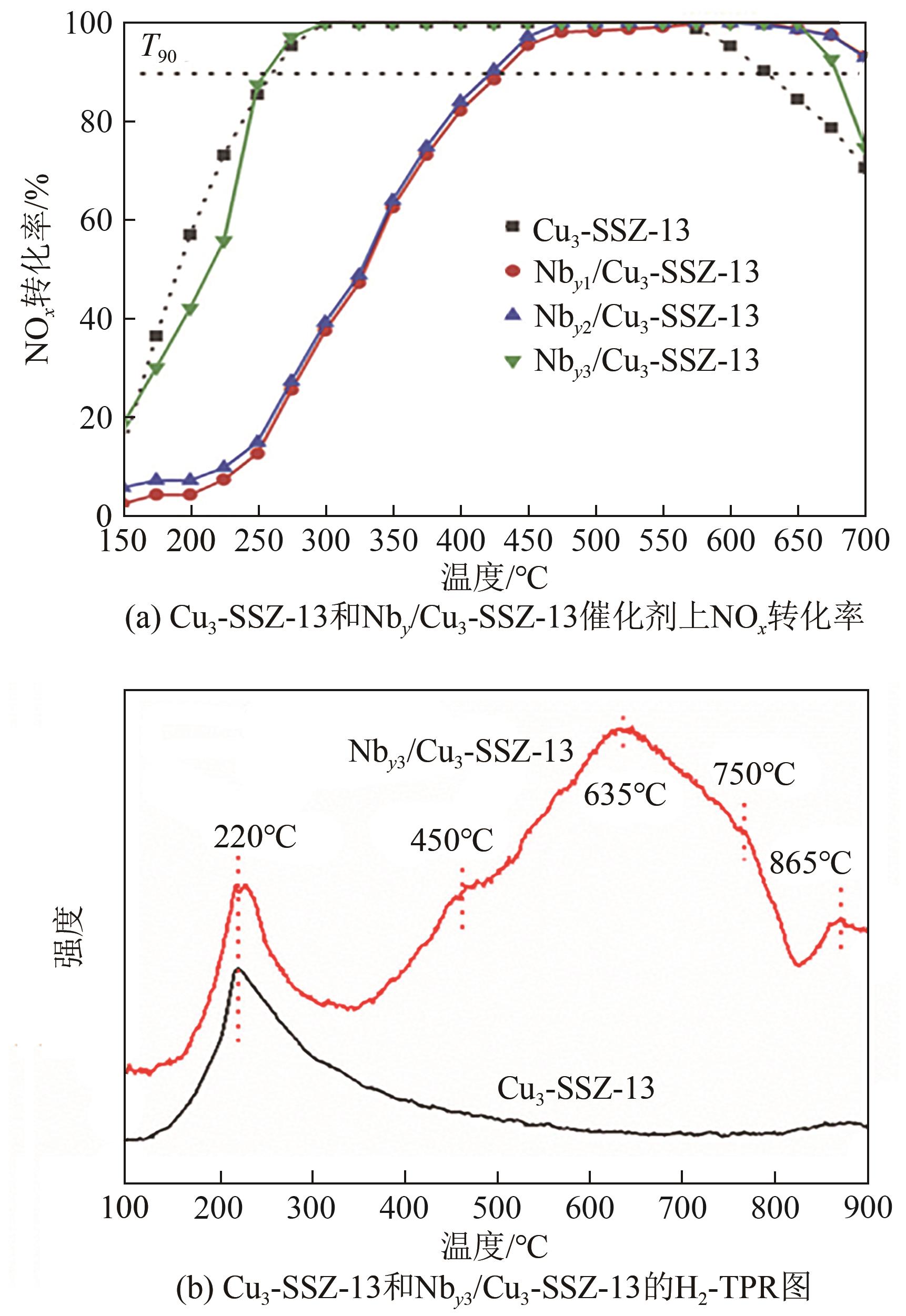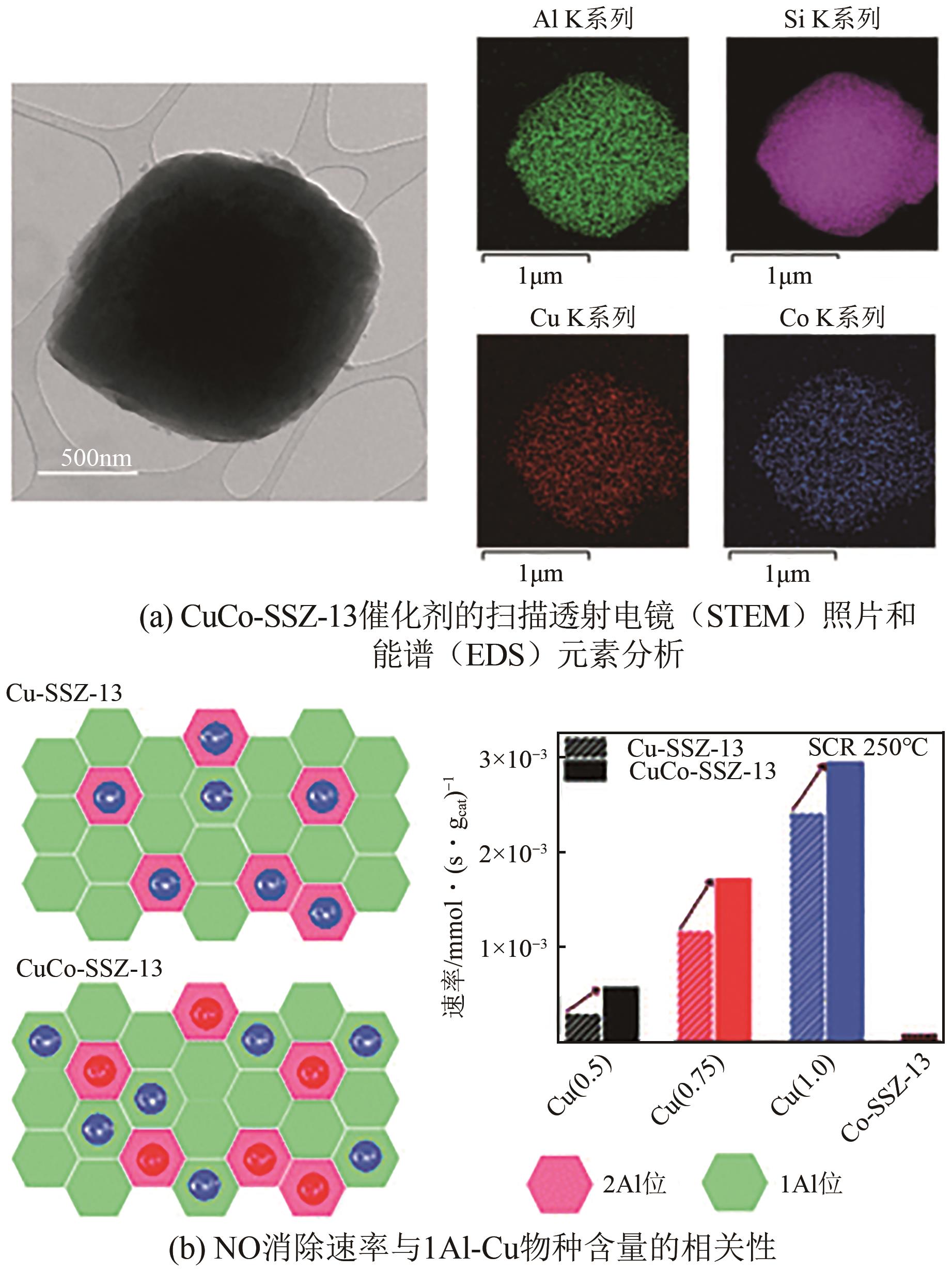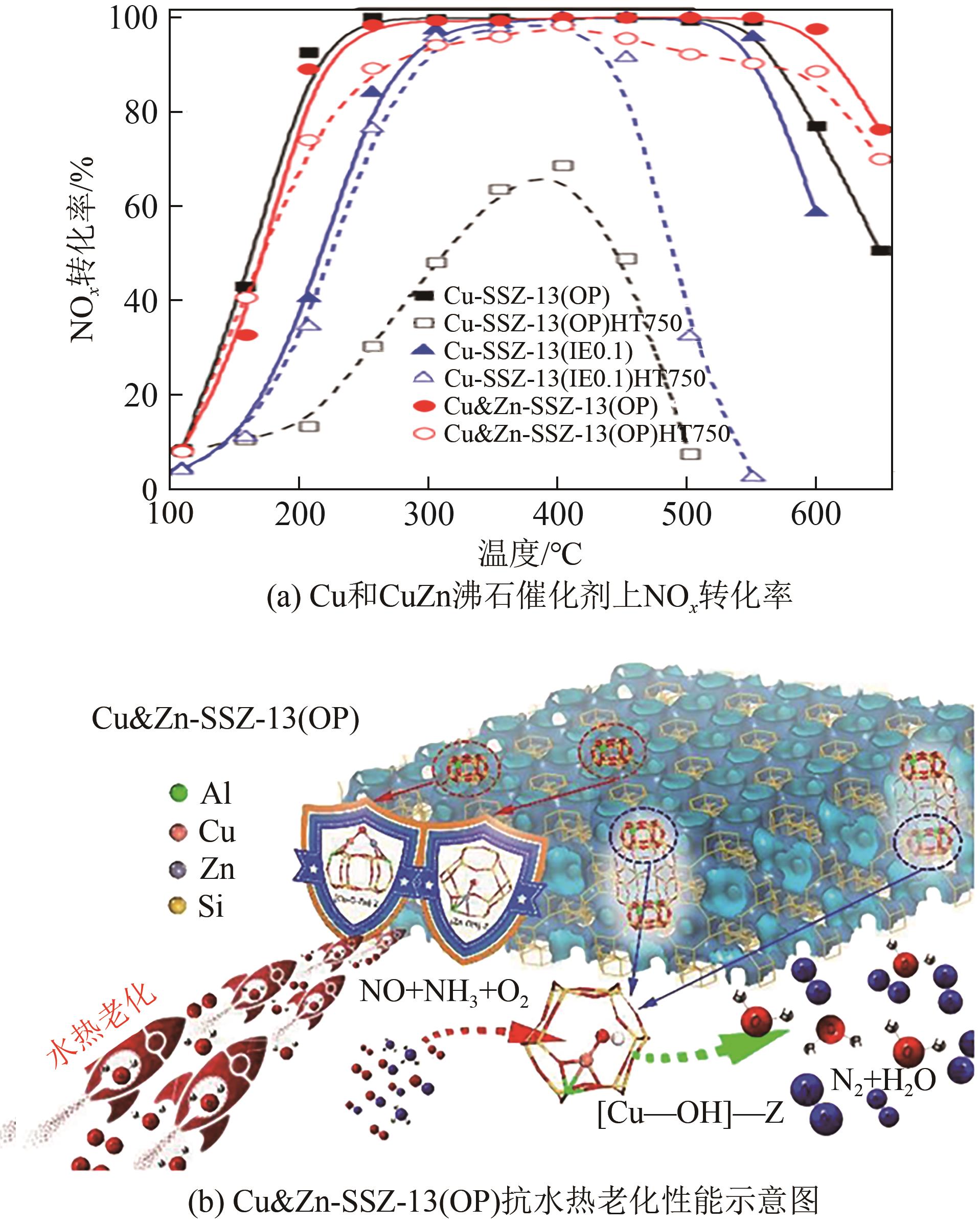Chemical Industry and Engineering Progress ›› 2023, Vol. 42 ›› Issue (6): 2963-2974.DOI: 10.16085/j.issn.1000-6613.2022-1524
• Industrial catalysis • Previous Articles Next Articles
Research progress in transition metals modified Cu-SSZ-13 zeolite denitration catalysts
YIN Chengyang( ), HOU Ming, YANG Shuang, MAO Di, LIU Junyan
), HOU Ming, YANG Shuang, MAO Di, LIU Junyan
- College of Chemistry and Chemical Engineering, Shenyang Normal University, Shenyang 110034, Liaoning, China
-
Received:2022-08-17Revised:2022-11-27Online:2023-06-29Published:2023-06-25 -
Contact:YIN Chengyang
过渡金属改性Cu-SSZ-13分子筛脱硝催化剂研究进展
- 沈阳师范大学化学化工学院,辽宁 沈阳 110034
-
通讯作者:殷成阳 -
作者简介:殷成阳(1981—),男,博士,副教授,硕士生导师,研究方向为环境催化。E-mail:ycy2006cc@126.com。 -
基金资助:国家自然科学基金(U1908204);辽宁省教育厅基本科研项目(LJKZ0996);大学生创新创业训练计划(X202210166140)
CLC Number:
Cite this article
YIN Chengyang, HOU Ming, YANG Shuang, MAO Di, LIU Junyan. Research progress in transition metals modified Cu-SSZ-13 zeolite denitration catalysts[J]. Chemical Industry and Engineering Progress, 2023, 42(6): 2963-2974.
殷成阳, 侯铭, 杨爽, 毛迪, 刘俊言. 过渡金属改性Cu-SSZ-13分子筛脱硝催化剂研究进展[J]. 化工进展, 2023, 42(6): 2963-2974.
share this article
Add to citation manager EndNote|Ris|BibTeX
URL: https://hgjz.cip.com.cn/EN/10.16085/j.issn.1000-6613.2022-1524
| 催化剂名称 | 制备方法 | 优点 | 缺点 | 铁含量 | 活性窗口/℃ | 抗性 | NO x 转化率/% | 文献 |
|---|---|---|---|---|---|---|---|---|
| Cu,Fe/SSZ-13 | 离子 交换法 | 很好地将Fe物种引入催化剂体系 | 存在固液分离及洗涤等烦琐步骤 | 0.51%(质量分数) | 225~625 | — | >90 | [ |
| CuFe-SSZ-13 | 0.357% | 150~650 | — | >98 | [ | |||
| Fe1.32/Cu-SSZ-13 | Fe/Cu为1.32 | 175~550 | — | >85 | [ | |||
| Ce0.017-Fe0.017/Cu-SSZ-13 | 0.017mol/L Fe3+ | 200~500 | 抗水硫 | >98 | [ | |||
| Fe/Cu-SSZ-13(IE) | 5.5% | 175~500 | — | >90 | [ | |||
| Fe-Cu-SSZ-13 | 0.089% | 225~625 | 抗水 | >90 | [ | |||
| Fe/Cu-SSZ-13 | 浸渍法 | 不需要洗涤,用水量最少 | 引入的Fe物种的落位和分散难控制 | 1% | 250~500 | 抗硫 | >90 | [ |
| Fe-Cu/SSZ-13-N-1% | 1.0% | 160~530 | 抗水 | >90 | [ | |||
| Fe0.63/Cu1.50-SSZ-13 | 一步法 | 制备过程相对简单 | 引入的Cu、Fe比例难于控制 | 0.63% | 160~580 | 抗硫 | >90 | [ |
| Fe0.5Cu4.8-SSZ-13 | 0.5% | 200~550 | 抗水硫 | >90 | [ | |||
| FeCu-SSZ-13 | Fe/Cu为0.2 | 200~600 | — | >90 | [ |
| 催化剂名称 | 制备方法 | 优点 | 缺点 | 铁含量 | 活性窗口/℃ | 抗性 | NO x 转化率/% | 文献 |
|---|---|---|---|---|---|---|---|---|
| Cu,Fe/SSZ-13 | 离子 交换法 | 很好地将Fe物种引入催化剂体系 | 存在固液分离及洗涤等烦琐步骤 | 0.51%(质量分数) | 225~625 | — | >90 | [ |
| CuFe-SSZ-13 | 0.357% | 150~650 | — | >98 | [ | |||
| Fe1.32/Cu-SSZ-13 | Fe/Cu为1.32 | 175~550 | — | >85 | [ | |||
| Ce0.017-Fe0.017/Cu-SSZ-13 | 0.017mol/L Fe3+ | 200~500 | 抗水硫 | >98 | [ | |||
| Fe/Cu-SSZ-13(IE) | 5.5% | 175~500 | — | >90 | [ | |||
| Fe-Cu-SSZ-13 | 0.089% | 225~625 | 抗水 | >90 | [ | |||
| Fe/Cu-SSZ-13 | 浸渍法 | 不需要洗涤,用水量最少 | 引入的Fe物种的落位和分散难控制 | 1% | 250~500 | 抗硫 | >90 | [ |
| Fe-Cu/SSZ-13-N-1% | 1.0% | 160~530 | 抗水 | >90 | [ | |||
| Fe0.63/Cu1.50-SSZ-13 | 一步法 | 制备过程相对简单 | 引入的Cu、Fe比例难于控制 | 0.63% | 160~580 | 抗硫 | >90 | [ |
| Fe0.5Cu4.8-SSZ-13 | 0.5% | 200~550 | 抗水硫 | >90 | [ | |||
| FeCu-SSZ-13 | Fe/Cu为0.2 | 200~600 | — | >90 | [ |
| 不同过渡金属改性 | 过渡金属改性的作用 | 优点 |
|---|---|---|
| Fe改性Cu-SSZ-13 | Fe物种与Cu物种具有协同作用,提高催化剂的氧化还原能力 | NH3-SCR反应的高温活性好,抗硫性能好 |
| Mn改性Cu-SSZ-13 | 催化剂酸位点数量增加,Mn和Cu之间相互作用提高催化剂的氧化还原能力 | NH3-SCR反应的低温活性好 |
| Nb改性Cu-SSZ-13 | Nb的引入增加了Cu活性物种数量,提高催化剂的氧化还原能力,增强催化剂酸位点 | 拓宽活性温度窗口范围 |
| Co改性Cu-SSZ-13 | Co的引入起占位作用,诱导Cu离子位于具有更高低温活性的1Al位,还可阻止SSZ-13脱铝 | NH3-SCR反应的低温活性好,水热稳定性高 |
| Ni改性Cu-SSZ-13 | Ni的引入可以抑制氧化铜形成 | 提高NH3-SCR反应的高温活性,进一步拓宽反应的活性温度窗口 |
| Ti改性Cu-SSZ-13 | Ti的引入可以保护高温水热过程中分子筛的骨架结构 | 具有优异的水热稳定性 |
| Zn改性Cu-SSZ-13 | Zn的引入有利于Cu物种更好的分散,起到稳定骨架的作用,防止Cu物种发生迁移 | 拓宽了NH3-SCR反应活性温度窗口,水热稳定性高 |
| 不同过渡金属改性 | 过渡金属改性的作用 | 优点 |
|---|---|---|
| Fe改性Cu-SSZ-13 | Fe物种与Cu物种具有协同作用,提高催化剂的氧化还原能力 | NH3-SCR反应的高温活性好,抗硫性能好 |
| Mn改性Cu-SSZ-13 | 催化剂酸位点数量增加,Mn和Cu之间相互作用提高催化剂的氧化还原能力 | NH3-SCR反应的低温活性好 |
| Nb改性Cu-SSZ-13 | Nb的引入增加了Cu活性物种数量,提高催化剂的氧化还原能力,增强催化剂酸位点 | 拓宽活性温度窗口范围 |
| Co改性Cu-SSZ-13 | Co的引入起占位作用,诱导Cu离子位于具有更高低温活性的1Al位,还可阻止SSZ-13脱铝 | NH3-SCR反应的低温活性好,水热稳定性高 |
| Ni改性Cu-SSZ-13 | Ni的引入可以抑制氧化铜形成 | 提高NH3-SCR反应的高温活性,进一步拓宽反应的活性温度窗口 |
| Ti改性Cu-SSZ-13 | Ti的引入可以保护高温水热过程中分子筛的骨架结构 | 具有优异的水热稳定性 |
| Zn改性Cu-SSZ-13 | Zn的引入有利于Cu物种更好的分散,起到稳定骨架的作用,防止Cu物种发生迁移 | 拓宽了NH3-SCR反应活性温度窗口,水热稳定性高 |
| 1 | WANG Di, JANGJOU Yasser, LIU Yong, et al. A comparison of hydrothermal aging effects on NH3-SCR of NO over Cu-SSZ-13 and Cu-SAPO-34 catalysts[J]. Applied Catalysis B: Environmental, 2015, 165: 438-445. |
| 2 | 郑伟, 陈佳玲, 郭立, 等. 金属负载型分子筛催化剂在NH3-SCR反应中水热稳定性的研究进展[J]. 燃料化学学报, 2020, 48(10): 1193-1207. |
| ZHENG Wei, CHEN Jialing, GUO Li, et al. Research progress of hydrothermal stability of metal-based zeolite catalysts in NH3-SCR reaction[J]. Journal of Fuel Chemistry and Technology, 2020, 48(10): 1193-1207. | |
| 3 | SHAN Yulong, DU Jinpeng, ZHANG Yan, et al. Selective catalytic reduction of NO x with NH3: Opportunities and challenges of Cu-based small-pore zeolites[J]. National Science Review, 2021, 8(10): nwab010. |
| 4 | CHEN Chuanmin, CAO Yue, LIU Songtao, et al. Review on the latest developments in modified vanadium-titanium-based SCR catalysts[J]. Chinese Journal of Catalysis, 2018, 39(8): 1347-1365. |
| 5 | HAN Lupeng, CAI Sixiang, GAO Min, et al. Selective catalytic reduction of NO x with NH3 by using novel catalysts: State of the art and future prospects[J]. Chemical Reviews, 2019, 119(19): 10916-10976. |
| 6 | 王修文, 李露露, 孙敬方, 等. 我国氮氧化物排放控制及脱硝催化剂研究进展[J]. 工业催化, 2019, 27(2): 1-23. |
| WANG Xiuwen, LI Lulu, SUN Jingfang, et al. Analysis of NO x emission and control in China and research progress in denitration catalysts[J]. Industrial Catalysis, 2019, 27(2): 1-23. | |
| 7 | JIANG Han, GUAN Bin, PENG Xuesong, et al. Influence of synthesis method on catalytic properties and hydrothermal stability of Cu/SSZ-13 for NH3-SCR reaction[J]. Chemical Engineering Journal, 2020, 379: 122358. |
| 8 | YONG Xin, ZHANG Cuijuan, WEI Miao, et al. Promotion of the performance of Cu-SSZ-13 for selective catalytic reduction of NO x by ammonia in the presence of SO2 during high temperature hydrothermal aging[J]. Journal of Catalysis, 2021, 394: 228-235. |
| 9 | GAO Feng, KWAK Jahun, SZANYI Janos, et al. Current understanding of Cu-exchanged chabazite molecular sieves for use as commercial diesel engine DeNO x catalysts[J]. Topics in Catalysis, 2013, 56(15): 1441-1459. |
| 10 | XIE Lijuan, LIU Fudong, REN Limin, et al. Excellent performance of one-pot synthesized Cu-SSZ-13 catalyst for the selective catalytic reduction of NO x with NH3 [J]. Environmental Science & Technology, 2014, 48(1): 566-572. |
| 11 | MOHAN S, DINESHA P, KUMAR S. NO x reduction behaviour in copper zeolite catalysts for ammonia SCR systems: a review[J]. Chemical Engineering Journal, 2020, 384: 123253. |
| 12 | GAO Feng, János SZANYI. On the hydrothermal stability of Cu/SSZ-13 SCR catalysts[J]. Applied Catalysis A: General, 2018, 560: 185-194. |
| 13 | FAN Chi, CHEN Zhen, PANG Lei, et al. The influence of Si/Al ratio on the catalytic property and hydrothermal stability of Cu-SSZ-13 catalysts for NH3-SCR[J]. Applied Catalysis A: General, 2018, 550: 256-265. |
| 14 | WANG A, WANG Y, WALTER E D, et al. NH3-SCR on Cu, Fe and Cu+Fe exchanged beta and SSZ-13 catalysts: Hydrothermal aging and propylene poisoning effects[J]. Catalysis Today, 2019, 320: 91-99. |
| 15 | DOAN Tuan, Phong DAM, NGUYEN Khang, et al. Copper-iron bimetal ion-exchanged SAPO-34 for NH3-SCR of NO x [J]. Catalysts, 2020, 10(3): 321. |
| 16 | YANG Xiaofan, WU Zili, Melanie MOSES-DEBUSK, et al. Heterometal incorporation in metal-exchanged zeolites enables low-temperature catalytic activity of NO x reduction[J]. The Journal of Physical Chemistry C, 2012, 116(44): 23322-23331. |
| 17 | ZHANG Ranran, LI Yonghong, ZHEN Tieli. Ammonia selective catalytic reduction of NO over Fe/Cu-SSZ-13[J]. RSC Advances, 2014, 4(94): 52130-52139. |
| 18 | LIU Xiaojiao, LI Yonghong, ZHANG Ranran. Ammonia selective catalytic reduction of NO over Ce-Fe/Cu-SSZ-13 catalysts[J]. RSC Advances, 2015, 5(104): 85453-85459. |
| 19 | 赵文雅, 李永红, 刘小娇, 等. Fe改性Cu-SSZ-13的方法对催化剂NH3-SCR脱硝性能的影响[J]. 化工进展, 2016, 35(12): 3898-3906. |
| ZHAO Wenya, LI Yonghong, LIU Xiaojiao, et al. Effect of preparation methods on de-NO x performance of Fe/Cu-SSZ-13 catalyst for NH3-SCR[J]. Chemical Industry and Engineering Progress, 2016, 35(12): 3898-3906. | |
| 20 | ZHANG Tao, LI Jianmei, LIU Jian, et al. High activity and wide temperature window of Fe-Cu-SSZ-13 in the selective catalytic reduction of NO with ammonia[J]. AIChE Journal, 2015, 61(11): 3825-3837. |
| 21 | WANG Xiaoying, SUN Yimin, HAN Fengyun, et al. Effect of Fe addition on the structure and SCR reactivity of one-pot synthesized Cu-SSZ-13[J]. Journal of Environmental Chemical Engineering, 2022, 10(3): 107888. |
| 22 | WANG Yijiao, XIE Lijuan, LIU Fudonget al. Effect of preparation methods on the performance of CuFe-SSZ-13 catalysts for selective catalytic reduction of NO x with NH3 [J]. Journal of Environmental Sciences, 2019, 81(7): 195-204. |
| 23 | WANG Yiyan, WAN Jie, CHEN Jiawei, et al. New insight into the doping effect of transition metals (Fe, Ti, Mn, and Ce) on the structure and catalytic performance of Cu-SSZ-13 zeolite catalysts for the NH3-SCR reaction[J]. Industrial & Engineering Chemistry Research, 2022, 61(41): 15066-15075. |
| 24 | YIN Chengyang, CHENG Peifu, LI Xiang, et al. Selective catalytic reduction of nitric oxide with ammonia over high-activity Fe/SSZ-13 and Fe/one-pot-synthesized Cu-SSZ-13 catalysts[J]. Catalysis Science & Technology, 2016, 6(20): 7561-7568. |
| 25 | 李淑珍, 赵小鸽, 张长明, 等. Fe改性原位Cu/SSZ-13催化剂柴油车尾气脱硝性能研究[J]. 环境科学学报, 2020, 40(1): 119-127. |
| LI Shuzhen, ZHAO Xiaoge, ZHANG Changming, et al. Study on denitration performance from diesel vehicle exhaust gas over the Fe modified In-situ Cu/SSZ-13 catalyst[J]. Acta Scientiae Circumstantiae, 2020, 40(1):119-127. | |
| 26 | WAN Jie, CHEN Jiawei, ZHAO Ru, et al. One-pot synthesis of Fe/Cu-SSZ-13 catalyst and its highly efficient performance for the selective catalytic reduction of nitrogen oxide with ammonia[J]. Journal of Environmental Sciences, 2021, 100: 306-316. |
| 27 | YUE Yuanyuan, LIU Ben, QIN Peng, et al. One-pot synthesis of FeCu-SSZ-13 zeolite with superior performance in selective catalytic reduction of NO by NH3 from natural aluminosilicates[J]. Chemical Engineering Journal, 2020, 398: 125515. |
| 28 | MING Yangfan, LI Gang. One-pot synthesis of FeCu-SSZ-13 using Cu-TEPA as the template by adding iron complexes[J]. Catalysis Science & Technology, 2021, 11(22): 7467-7474. |
| 29 | CHEN Mengyang, WEI Yingzhen, HAN Jinfeng, et al. Enhancing catalytic performance of Cu-SSZ-13 for the NH3-SCR reaction via in situ introduction of Fe3+ with diatomite[J]. Materials Chemistry Frontiers, 2021, 5(21): 7787-7795. |
| 30 | MESILOV Vitaly, XIAO Yang, DAHLIN Sandra, et al. First-principles calculations of condition-dependent Cu/Fe speciation in sulfur-poisoned Cu- and Fe-SSZ-13 catalysts[J]. The Journal of Physical Chemistry C, 2021, 125(8): 4632-4645. |
| 31 | LIU Qingling, FU Zhenchao, MA Lei, et al. MnO x -CeO2 supported on Cu-SSZ-13: a novel SCR catalyst in a wide temperature range[J]. Applied Catalysis A: General, 2017, 547: 146-154. |
| 32 | SONG Chaoming, ZHANG Lihong, LI Zhenguo, et al. Co-exchange of Mn: a simple method to improve both the hydrothermal stability and activity of Cu-SSZ-13 NH3-SCR catalysts[J]. Catalysts, 2019, 9(5): 455. |
| 33 | DU Jinpeng, WANG Jingyi, SHI Xiaoyan, et al. Promoting effect of Mn on in situ synthesized Cu-SSZ-13 for NH3-SCR[J]. Catalysts, 2020, 10(12): 1375. |
| 34 | WANG Zhiheng, XU Xi, ZHU Yvxiao, et al. One-pot synthesis of hierarchical MnCu-SSZ-13 catalyst with excellent NH3-SCR activity at low temperatures[J]. Microporous and Mesoporous Materials, 2022, 333: 111720. |
| 35 | WEI Yingzhen, CHEN Mengyang, REN Xiaoyu, et al. One-pot three-dimensional printing robust self-supporting MnO x /Cu-SSZ-13 zeolite monolithic catalysts for NH3-SCR[J]. CCS Chemistry, 2022, 4(5): 1708-1719. |
| 36 | ZHAO Huawang, LI Huisheng, LI Xianghui, et al. The promotion effect of Fe to Cu-SAPO-34 for selective catalytic reduction of NO x with NH3 [J]. Catalysis Today, 2017, 297: 84-91. |
| 37 | ZHANG Dong, YANG Ralph T. NH3-SCR of NO over one-pot Cu-SAPO-34 catalyst: performance enhancement by doping Fe and MnCe and insight into N2O formation[J]. Applied Catalysis A: General, 2017, 543: 247-256. |
| 38 | XIE Lijun, LIU Chang, DENG Yun, et al. Promotion effect of Fe species on SO2 resistance of Cu-SSZ-13 catalysts for NO x reduction by NH3 [J]. Industrial & Engineering Chemistry Research, 2022, 61(25): 8698-8707. |
| 39 | WU Ganxue, LIU Siyi, CHEN Zhiqiang, et al. Promotion effect of alkaline leaching on the catalytic performance over Cu/Fe-SSZ-13 catalyst for selective catalytic reduction of NO x with NH3 [J]. Journal of the Taiwan Institute of Chemical Engineers, 2022, 134: 104355. |
| 40 | KUMAR M S, ALPHIN M S. Influence of Fe-Cu-SSZ-13 and hybrid Fe-Cu-SSZ-13 zeolite catalyst in ammonia-selective catalytic reduction (NH3-SCR) of NO x [J]. Reaction Kinetics, Mechanisms and Catalysis, 2022, 135(5): 2551-2563. |
| 41 | ZHAO Shuang, HUANG Liming, JIANG Boqiong, et al. Stability of Cu-Mn bimetal catalysts based on different zeolites for NO x removal from diesel engine exhaust[J]. Chinese Journal of Catalysis, 2018, 39(4): 800-809. |
| 42 | ZHANG Minhua, CAO Haibo, CHEN Yifei, et al. Role of Mn: Promotion of fast-SCR for Cu-SAPO-34 in low-temperature selective catalytic reduction with ammonia[J]. Catalysis Surveys from Asia, 2019, 23(3): 245-255. |
| 43 | JIANG Boqiong, ZHAO Shuang, WANG Yaolin, et al. Plasma-enhanced low temperature NH3-SCR of NO x over a Cu-Mn/SAPO-34 catalyst under oxygen-rich conditions[J]. Applied Catalysis B: Environmental, 2021, 286: 119886. |
| 44 | ZHANG Shoute, PANG Lei, CHEN Zhen, et al. Cu/SSZ-13 and Cu/SAPO-34 catalysts for deNO x in diesel exhaust: Current status, challenges, and future perspectives[J]. Applied Catalysis A: General, 2020, 607: 117855. |
| 45 | GAO Feng. Fe-exchanged small-pore zeolites as ammonia selective catalytic reduction (NH3-SCR) catalysts[J]. Catalysts, 2020, 10(11): 1324. |
| 46 | WANG Xiaofeng, XU Yang, ZHAO Zhe, et al. Recent progress of metal-exchanged zeolites for selective catalytic reduction of NO x with NH3 in diesel exhaust[J]. Fuel, 2021, 305: 121482. |
| 47 | CHEN Jialing, HUANG Wei, BAO Sizhuoet al. A review on the characterization of metal active sites over Cu-based and Fe-based zeolites for NH3-SCR[J]. RSC Advances, 2022, 12(43): 27746-27765. |
| 48 | MAGDALENA Jabłonska. Recent progress in the selective catalytic reduction of NO x with NH3 on Cu-SAPO-34 catalysts[J]. Molecular Catalysis, 2022, 518: 112111. |
| 49 | LIU Jinzhou, TANG Xuejiao, XING Cheng, et al. Niobium modification for improving the high-temperature performance of Cu-SSZ-13 in selective catalytic reduction of NO by NH3 [J]. Journal of Solid State Chemistry, 2021, 296: 122028. |
| 50 | WANG Jingang, LIU Jinzhou, TANG Xuejiao, et al. The promotion effect of niobium on the low-temperature activity of Al-rich Cu-SSZ-13 for selective catalytic reduction of NO x with NH3 [J]. Chemical Engineering Journal, 2021, 418: 129433. |
| 51 | LEE H, SONG I, JEON S W, et al. Control of the Cu ion species in Cu-SSZ-13 via the introduction of Co2+ co-cations to improve the NH3-SCR activity[J]. Catalysis Science & Technology, 2021, 11(14): 4838-4848. |
| 52 | CHEN Mengyang, SUN Qiming, YANG Xiangguang, et al. A dual-template method for the synthesis of bimetallic CuNi/SSZ-13 zeolite catalysts for NH3-SCR reaction[J]. Inorganic Chemistry Communications, 2019, 105: 203-207. |
| 53 | WANG Linxia, CHEN Haijun, WANG Weichao. N-H bond activation in ammonia by TM-SSZ-13 (Fe, Co, Ni and Cu) zeolites: a first-principles calculation[J]. Physical Chemistry Chemical Physics, 2019, 21(3): 1506-1513. |
| 54 | 刘梦梦, 张国佩, 常丽萍, 等. 钛掺杂原位制备Cu-SSZ-13及其脱硝性能的研究[J]. 现代化工, 2019, 39(11): 89-94. |
| LIU Mengmeng, ZHANG Guopei, CHANG Liping, et al. Study on denitrification performance of titanium doped Cu-SSZ-13 prepared by in-situ method[J]. Modern Chemical Industry, 2019, 39(11): 89-94. | |
| 55 | XU Ruinian, WANG Ziyang, LIU Ning, et al. Understanding Zn functions on hydrothermal stability in a one-pot-synthesized Cu&Zn-SSZ-13 catalyst for NH3 selective catalytic reduction[J]. ACS Catalysis, 2020, 10(11): 6197-6212. |
| [1] | ZHANG Mingyan, LIU Yan, ZHANG Xueting, LIU Yake, LI Congju, ZHANG Xiuling. Research progress of non-noble metal bifunctional catalysts in zinc-air batteries [J]. Chemical Industry and Engineering Progress, 2023, 42(S1): 276-286. |
| [2] | SHI Yongxing, LIN Gang, SUN Xiaohang, JIANG Weigeng, QIAO Dawei, YAN Binhang. Research progress on active sites in Cu-based catalysts for CO2 hydrogenation to methanol [J]. Chemical Industry and Engineering Progress, 2023, 42(S1): 287-298. |
| [3] | XIE Luyao, CHEN Songzhe, WANG Laijun, ZHANG Ping. Platinum-based catalysts for SO2 depolarized electrolysis [J]. Chemical Industry and Engineering Progress, 2023, 42(S1): 299-309. |
| [4] | YANG Xiazhen, PENG Yifan, LIU Huazhang, HUO Chao. Regulation of active phase of fused iron catalyst and its catalytic performance of Fischer-Tropsch synthesis [J]. Chemical Industry and Engineering Progress, 2023, 42(S1): 310-318. |
| [5] | WANG Jiaqing, SONG Guangwei, LI Qiang, GUO Shuaicheng, DAI Qingli. Rubber-concrete interface modification method and performance enhancement path [J]. Chemical Industry and Engineering Progress, 2023, 42(S1): 328-343. |
| [6] | CHEN Chongming, CHEN Qiu, GONG Yunqian, CHE Kai, YU Jinxing, SUN Nannan. Research progresses on zeolite-based CO2 adsorbents [J]. Chemical Industry and Engineering Progress, 2023, 42(S1): 411-419. |
| [7] | WANG Lele, YANG Wanrong, YAO Yan, LIU Tao, HE Chuan, LIU Xiao, SU Sheng, KONG Fanhai, ZHU Canghai, XIANG Jun. Influence of spent SCR catalyst blending on the characteristics and deNO x performance for new SCR catalyst [J]. Chemical Industry and Engineering Progress, 2023, 42(S1): 489-497. |
| [8] | DENG Liping, SHI Haoyu, LIU Xiaolong, CHEN Yaoji, YAN Jingying. Non-noble metal modified vanadium titanium-based catalyst for NH3-SCR denitrification simultaneous control VOCs [J]. Chemical Industry and Engineering Progress, 2023, 42(S1): 542-548. |
| [9] | CHENG Tao, CUI Ruili, SONG Junnan, ZHANG Tianqi, ZHANG Yunhe, LIANG Shijie, PU Shi. Analysis of impurity deposition and pressure drop increase mechanisms in residue hydrotreating unit [J]. Chemical Industry and Engineering Progress, 2023, 42(9): 4616-4627. |
| [10] | ZHU Jie, JIN Jing, DING Zhenghao, YANG Huipan, HOU Fengxiao. Modification of CaSO4 oxygen carrier by Zhundong coal ash in chemical looping gasification and its mechanism [J]. Chemical Industry and Engineering Progress, 2023, 42(9): 4628-4635. |
| [11] | WANG Jingang, ZHANG Jianbo, TANG Xuejiao, LIU Jinpeng, JU Meiting. Research progress on modification of Cu-SSZ-13 catalyst for denitration of automobile exhaust gas [J]. Chemical Industry and Engineering Progress, 2023, 42(9): 4636-4648. |
| [12] | WANG Peng, SHI Huibing, ZHAO Deming, FENG Baolin, CHEN Qian, YANG Da. Recent advances on transition metal catalyzed carbonylation of chlorinated compounds [J]. Chemical Industry and Engineering Progress, 2023, 42(9): 4649-4666. |
| [13] | ZHANG Qi, ZHAO Hong, RONG Junfeng. Research progress of anti-toxicity electrocatalysts for oxygen reduction reaction in PEMFC [J]. Chemical Industry and Engineering Progress, 2023, 42(9): 4677-4691. |
| [14] | GE Quanqian, XU Mai, LIANG Xian, WANG Fengwu. Research progress on the application of MOFs in photoelectrocatalysis [J]. Chemical Industry and Engineering Progress, 2023, 42(9): 4692-4705. |
| [15] | WANG Weitao, BAO Tingyu, JIANG Xulu, HE Zhenhong, WANG Kuan, YANG Yang, LIU Zhaotie. Oxidation of benzene to phenol over aldehyde-ketone resin based metal-free catalyst [J]. Chemical Industry and Engineering Progress, 2023, 42(9): 4706-4715. |
| Viewed | ||||||
|
Full text |
|
|||||
|
Abstract |
|
|||||
